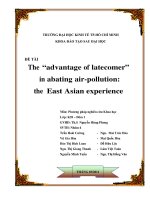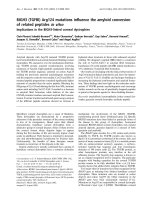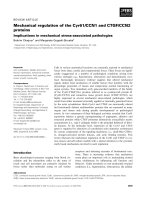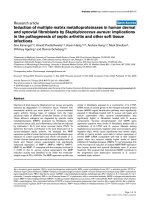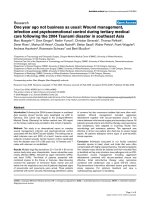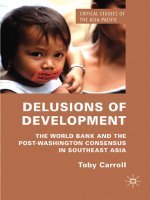The asean identity implications in southeast asian regionalism (tt)
Bạn đang xem bản rút gọn của tài liệu. Xem và tải ngay bản đầy đủ của tài liệu tại đây (126.35 KB, 6 trang )
University of Warsaw
Faculty of Political Science and International Studies
Hoang Le Tra My
381836
THE ASEAN IDENTITY IMPLICATIONS IN SOUTHEAST ASIAN
REGIONALISM
Second cycle degree thesis
Graduated programme in International Relations
International Relations in English
The thesis written under the supervision of
Professor Edward Halizak
Institute of International Relations
Warsaw, November 2018
Oświadczenie kierującego pracą
Oświadczam, że niniejsza praca została przygotowana pod moim kierunkiem i stwierdzam,
że spełniła ona warunki do przedstawienia jej w postępowaniu o nadanie tytułu zawodowego.
Data
Podpis kierującego pracą
Statement of the Supervisor on Submission of the Thesis
I hereby certify that the thesis submitted has been prepared under my supervision and I declare
that it satisfies the requirements of submission in the proceedings for the award of a degree.
Date
Signature of the Supervisor:
Oświadczenie autora (autorów) pracy
Świadom odpowiedzialności prawnej oświadczam, że niniejsza praca dyplomowa została
napisana przeze mnie samodzielnie i nie zawiera treści uzyskanych w sposób niezgodny
z obowiązującymi przepisami.
Oświadczam również, że przedstawiona praca nie była wcześniej przedmiotem procedur
związanych z uzyskaniem tytułu zawodowego w wyższej uczelni.
Oświadczam ponadto, że niniejsza wersja pracy jest identyczna z załączoną wersją
elektroniczną.
Data
Podpis autora (autorów) pracy
Statement of the Author(s) on Submission of the Thesis
Aware of legal liability I certify that the thesis submitted has been prepared by myself and does
not include information gathered contrary to the law.
I also declare that the thesis submitted has not been the subject of proceedings resulting in the
award of a university degree.
Furthermore, I certify that the submitted version of the thesis is identical with its attached
electronic version.
Date
Signature of the Author(s) of the thesis
1
STRESZCZNIE
We współczesnych stosunkach międzynarodowych regionalizm jest jedną z
najbardziej znaczących tendencji. W ostatnim czasie wzrasta znaczenie podsystemu
południowo-wschodnioazjatyckiego jako ważnego elementu w systemie stosunków
międzynarodowych. W związku z tym regionalizm południowo-wschodnioazjatycki
staje się przedmiotem badań naukowych prowadzonych na całym świecie. Jednakże
większość
piśmiennictwa
dotyczącego
regionalizmu
południowo-
wschodnioazjatyckiego skupia się głównie na aspektach polityki twardej siły, pomijając
aspekty ideowe. Nakreśliwszy tę lukę w analizie zagadnienia, niniejsza praca stanowi
próbę przeanalizowania jednego z pomijanych elementów ideowych – tożsamości
regionalnej i jej roli w regionalizmie południowo-wschodnioazjatyckim, wykorzystując
koncepcję konstruktywizmu połączoną z wybranymi elementami socjologii. Dla
potrzeb pracy wykorzystano tradycyjne podejście konstruktywistyczne w celu
przeanalizowania
konsekwencji
tożsamości
ASEAN
dla
regionalizmu
na
międzynarodowym, regionalnym i krajowym stopniu analizy. Pomimo że założenia
tradycyjnych teorii odgrywają znaczącą rolę w opisywaniu regionalizmu południowowschodnioazjatyckiego, w niniejszej pracy ustalono, że proces budowania tożsamości
regionalnej w ASEAN ma wpływ także na postawy państw na regionalizm południowowschodnioazjatycki. Dlatego wnioski z niniejszej pracy sugerują, że regionalna
tożsamość ASEAN powinna być rozważana w sposób bardziej poważny w celu bardziej
dogłębnego zrozumienia regionalizmu południowo-wschodnioazjatyckiego.
Słowa kluczowe: konstruktywizm, regionalizm, tożsamość, ASEAN, Azja
Południowo-Wschodnia
Area of Study: Stosunki miedzynarodowe, 14.600
Tożsamość ASEAN – konsekwencje dla regionalizmu południowowschodnioazjatyckiego
2
ABSTRACT
In the modern era of international relations, regionalism is one of the most
prominent trends. Recently, Southeast Asia subsystem has become an increasingly
important unit of the international system. Therefore, Southeast Asian regionalism has
got much attention of scholars all over the world. However, the majority of literature
about Southeast Asian regionalism focus mostly on material aspects and ignore
ideational ones. Acknowledging this gap of analysis, the thesis attempts to examine one
of neglecting ideational elements - regional identity, and its role in Southeast Asia
regionalism by drawing into the idea of constructivism combining with some insights
of sociology. The thesis chooses conventional constructivist approach to analyze
implications of the ASEAN identity on Southeast Asia regionalism at international,
regional, and national level of analysis. Although assumptions of classical theories play
a significant role in explaining Southeast Asia regionalism, the thesis ascertains that
regional identity-building process of the ASEAN also has effects or semi-effects on
behaviors of Southeast Asia states as well as Southeast Asia regionalism. Thus, it is
suggested that the ASEAN regional identity should be taken more seriously for more
thorough comprehension of Southeast Asia regionalism.
Key words: Constructivism, Regionalism, Identity, the ASEAN, Southeast Asia.
3
TABLE OF CONTENTS
Statement of the thesis supervisor
Abstract
Table of contents
INTRODUCTION ........................................................ Error! Bookmark not defined.
CHAPTER I - Regional integration and Constructivism ........................................... 9
1.1 Regional integration .......................................................................................... 9
1.1.1 Definition and concept ................................................................................ 9
1.1.2 Evolution of regional integration............................................................... 11
1.1.3 Complementary theoretical approach to understanding regional integration
.......................................................................................................................... 13
1.2 Constructivist Theories of International Relations ........................................... 17
1.2.1 The rise of constructivism ......................................................................... 18
1.2.2 Core assumptions of constructivism .......................................................... 19
1.2.3 Constructivist variants on Identity............................................................. 20
CHAPTER II - Southeast Asia & the ASEAN ......................................................... 24
2.1 Southeast Asia ................................................................................................. 24
2.1.1 Defining the Southeast Asian region ......................................................... 24
2.1.2 Typical characteristics of Southeast Asia .................................................. 25
2.1.3 The development of Southeast Asian regionalism ..................................... 27
2.2 The background on the ASEAN....................................................................... 29
2.2.1 The establishment of the ASEAN ............................................................. 29
2.2.2 The ASEAN integration process ............................................................... 30
CHAPTER III-The ASEAN Identity & Implications in Southeast Asian Regionalism
.................................................................................................................................. 34
3.1 The ASEAN identity ....................................................................................... 34
3.1.1 The concept of Identity ............................................................................. 34
3.1.2 Regional identity in Southeast Asia........................................................... 36
4
3.1.3 The process of the ASEAN identity formation .......................................... 37
3.1.4 The source of the ASEAN identity-building process ................................. 39
3.1.5 The "ASEAN Way" - the core component of the ASEAN identity – building
process............................................................................................................... 41
3.2 Implications of ASEAN collective identity ...................................................... 46
CHAPTER IV - Challenges and The ways forward ................................................. 49
4.1. Challenges of ASEAN identity ....................................................................... 49
4.1.1 Limitations of ASEAN identity’s analytic utility....................................... 49
4.1.2 Difficulties of an ASEAN identity in practice ........................................... 50
4.2 Suggestions for future development of ASEAN identity .................................. 54
CONCLUSION ......................................................................................................... 59
Bibiliography
5
